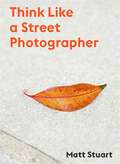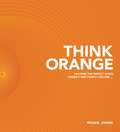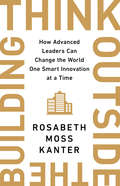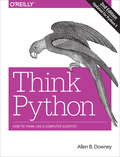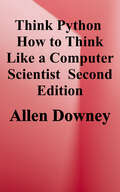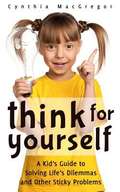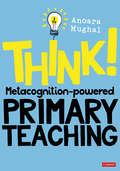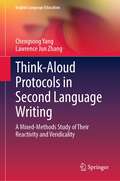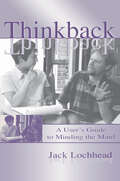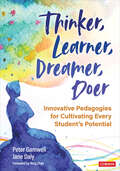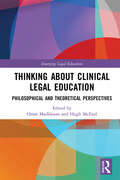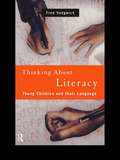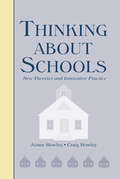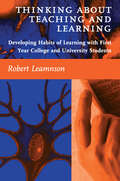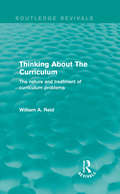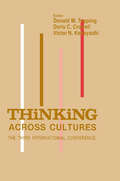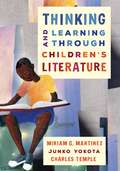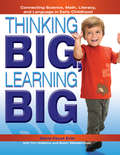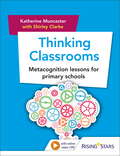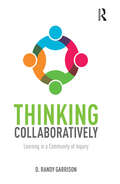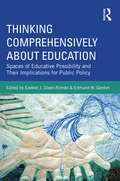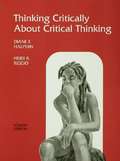- Table View
- List View
Think Like a Street Photographer
by Derren Brown Matt Stuart'Never does that old maxim "the harder I practice, the luckier I get" ring truer.' - Matt StuartStreet photography may look like luck, but you have to get out there and hone your craft if you want to shake up those luck vibes. Matt Stuart never goes out without his trusty Leica and, in a career spanning twenty years, has taken some of the most accomplished, witty and well-known photographs of the streets.From understanding how to be invisible on a busy street, to anticipating a great image in the chaos of a crowd, Matt Stuart reveals in over 20 chapters the hard-won skills and secrets that have led to his greatest shots. He explains his purist and uniquely playful approach to street photography leaving the reader full of ideas to use in their own photography. Illustrated throughout with 100 of Stuart's images, this is a unique opportunity to learn from one of the finest street photographers around.
Think Orange: Imagine The Impact When Church And Family Collide...
by Reggie JoinerFounder of the Orange Conference, Reggie Joiner looks at what would happen if the church and families combined their efforts to create a revolutionary strategy to affect the lives of children.
Think Outside the Building: How Advanced Leaders Can Change the World One Smart Innovation at a Time
by Rosabeth Moss KanterOne of the leading business thinkers in the world offers a bold, new theory of advanced leadership for tackling the world's complex, messy, and recalcitrant social and environmental problems.Over a decade ago, renowned innovation expert Rosabeth Moss Kanter co-founded and then directed Harvard's Advanced Leadership Initiative. Her breakthrough work with hundreds of successful professionals and executives, as well as aspiring young entrepreneurs, identifies the leadership paradigm of the future: the ability to "think outside the building" to overcome establishment paralysis and produce significant innovation for a better world.Kanter provides extraordinary accounts of the successes and near-stumbles of purpose-driven men and women from diverse backgrounds united in their conviction that positive change is possible.A former Trader Joe's executive, for example, navigated across business, government, and community sectors to deal with poor nutrition in inner cities while reducing food waste. A concerned European banker used the power of persuasion, not position, to find novel financing for improving the health of the oceans. A Washington couple enticed global partners to join an Uber-like platform to match skilled refugees with talent-hungry companies. A visionary journalist-turned-entrepreneur closed social divides by giving fifty million social media users access to free local education and culture.When traditional approaches are inadequate or resisted, advanced leadership skills are essential. In this book, Kanter shows how people everywhere can unleash their creativity and entrepreneurial adroitness to mobilize partners across challenging cultural, social, and political situations and innovate for a brighter future.
Think Python: How To Think Like A Computer Scientist
by Allen B. DowneyIf you want to learn how to program, working with Python is an excellent way to start. This hands-on guide takes you through the language a step at a time, beginning with basic programming concepts before moving on to functions, recursion, data structures, and object-oriented design. This second edition and its supporting code have been updated for Python 3.Through exercises in each chapter, youâ??ll try out programming concepts as you learn them. Think Python is ideal for students at the high school or college level, as well as self-learners, home-schooled students, and professionals who need to learn programming basics. Beginners just getting their feet wet will learn how to start with Python in a browser.Start with the basics, including language syntax and semanticsGet a clear definition of each programming conceptLearn about values, variables, statements, functions, and data structures in a logical progressionDiscover how to work with files and databasesUnderstand objects, methods, and object-oriented programmingUse debugging techniques to fix syntax, runtime, and semantic errorsExplore interface design, data structures, and GUI-based programs through case studies
Think Python: How to Think Like a Computer Scientist
by Allen DowneyIf you want to learn how to program, working with Python is an excellent way to start. This hands-on guide takes you through the language a step at a time, beginning with basic programming concepts before moving on to functions, recursion, data structures, and object-oriented design. This second edition and its supporting code have been updated for Python 3. <p><p> Through exercises in each chapter, you’ll try out programming concepts as you learn them. Think Python is ideal for students at the high school or college level, as well as self-learners, home-schooled students, and professionals who need to learn programming basics. Beginners just getting their feet wet will learn how to start with Python in a browser. <p><p>• Start with the basics, including language syntax and semantics <p>• Get a clear definition of each programming concept <p>• Learn about values, variables, statements, functions, and data structures in a logical progression <p>• Discover how to work with files and databases <p>• Understand objects, methods, and object-oriented programming <p>• Use debugging techniques to fix syntax, runtime, and semantic errors <p>• Explore interface design, data structures, and GUI-based programs through case studies
Think for Yourself
by Cynthia MacgregorHow many times have you faced a dilemma and said to yourself: "Uh-oh, what do I do now?" And don't you hate that feeling that goes with it, that "uh-oh feeling," when you're facing a problem that you don't have an answer for, a what-do-I-do-now problem? Life is full of problems. Sometimes you know what the answer is to a problem. Maybe you don't like the answer, but you know what you're supposed to do. Like when your friend asks you to help him cheat on a test. You know you're supposed to say, "No". The problem is finding a way to say No without seeming like a bad friend. Think for Yourself is to help you deal with life's dilemmas--whether manners, morals, values, or even very serious situations that you just don't know how to handle. We haven't thought of every problem you're likely to have to deal with. Everyone's life is different. But what we want to do is two things: 1. Discuss some of the problems you might face and possible ways to deal with them; and 2. Help you learn to think in a creative way to help you solve other problems on your own. Are you ready? Let's get started solving life's dilemmas!
Think!: Metacognition-powered Primary Teaching (Corwin Ltd)
by Anoara MughalThe perfect guide to help you embed metacognitive approaches to your teaching. What is metacognition and how can you use it in your teaching? Metacognition – being aware of our own ways of thinking – is popular in education, but it is not always obvious how it links to teaching practice and how to teach it explicitly. This book translates meaningful concepts from research literature not only into practical strategies to try in your classroom but also gives you the opportunity to reflect on metacognitive strategies that you already use. Key topics include: Metacognitive strategies in a range of subjects, including English and mathematics Dismantling metacognitive misconceptions How to use metacognition to improve test performance The importance of developing a growth mindset How to develop self-regulation in the classroom
Think!: Metacognition-powered Primary Teaching (Corwin Ltd)
by Anoara MughalThe perfect guide to help you embed metacognitive approaches to your teaching. What is metacognition and how can you use it in your teaching? Metacognition – being aware of our own ways of thinking – is popular in education, but it is not always obvious how it links to teaching practice and how to teach it explicitly. This book translates meaningful concepts from research literature not only into practical strategies to try in your classroom but also gives you the opportunity to reflect on metacognitive strategies that you already use. Key topics include: Metacognitive strategies in a range of subjects, including English and mathematics Dismantling metacognitive misconceptions How to use metacognition to improve test performance The importance of developing a growth mindset How to develop self-regulation in the classroom
Think-Aloud Protocols in Second Language Writing: A Mixed-Methods Study of Their Reactivity and Veridicality (English Language Education #34)
by Lawrence Jun Zhang Chengsong YangThis book addresses the validity of think-aloud protocols (TAPs) in L2 writing research through a mixed methods study and proposes effective approaches for their valid implementation. The book uncovers the reactive effects that TAPs have on L2 writing performance and processes, and examines how individual factors moderate this reactivity. It further presents and categorizes participants' perceptions regarding reactivity and veridicality. To enhance veridicality, the book identifies incomplete TAPs using retrospective verbal reports as a reference point. Recommendations for utilizing TAPs include considering participants' individual differences, recent experiences, and emotions. This book will be valuable to educators teaching methodology in second or foreign language education, applied linguistics, or writing research, and to L2 researchers or graduate students with a broad interest in research methods, process-based research, or writing studies, or planning to incorporate TAPs into their research.
Thinkback: A User's Guide to Minding the Mind
by Jack LochheadThe fundamental premise of Thinkback--based on overwhelming scientific evidence--is that intelligence is not fixed at birth and that, with consistent effort, we can dramatically improve our capacities. It counters the claims of some psychologists that it is impossible to increase intelligence because that ability is determined at birth. Thinkback builds on the Think Aloud strategies in Arthur Whimbey and Jack Lochhead's popular and widely used volume, Problem Solving & Comprehension, now in its sixth edition. Since its publication, thousands of students have used these techniques for improving thinking and analytic reasoning to increase test scores, win National Merit Scholarships, and gain admission to top-ranked professional schools. Now, Thinkback shows how these powerful strategies can be applied to a range of important academic areas including mathematics, language arts, social studies, and science. Thinkback is a tool for student empowerment--a strategy they can use to improve both their ability to think and their ability to learn. The Thinkback classroom, on the other hand, is a design for teacher liberation--enabling them to see learning more clearly than they ever could before. This is the only book currently available that contains detailed models of metacognitive dialogues in the classroom. These dialogues enable teachers and teacher educators to observe thinking processes that have previously been invisible and undetectable. Based on over 20 years of careful cognitive research, the dialogues provide teachers with important insights into the nature of thinking and problem solving. Thinkback is a picture window on the working mind. This book: *Describes the Thinkback strategy for making thinking strategies explicit, easy to teach, and easy to learn. *Includes numerous detailed examples that demonstrate the Thinkback technique. Six quite different learning strategies--derived from the work of David Perkins, Barry Beyer, Arthur Whimbey, Joseph Novak, John R. Hayes, and Lev Landa--are presented to illustrate the range of contexts in which Thinkback can be used. *Spans the wide gap between unstructured constructivist-style instruction and lock-step memorization drills. The Thinkback technique can convert a teacher-centered rote memory lesson into an intellectually challenging student-centered exploration, while at the same time maintaining specific content mastery objectives. Or it can be used to add subtle structure to an open-ended creative exercise, allowing students of all levels to benefit and insuring that no one is left floundering. Thinkback is an important new resource for teachers and students in high schools, community colleges, and introductory college programs; industrial trainers; home schoolers; parents; and anyone else who would like to see learners become more intelligent and are willing to work to see that they do.
Thinker, Learner, Dreamer, Doer: Innovative Pedagogies for Cultivating Every Student’s Potential
by Jane Daly Peter GamwellMaster the Age of Complexity through innovative growth. From far-reaching impacts of COVID-19 to environmental and economic concerns, we’re living in the Age of Complexity that will likely be with us for generations to come. How then can schools and organizations change their learning environments to foster innovative thinking in students when the Age of Complexity is always at the forefront? Peter Gamwell and Jane Daly answer that question and more by demonstrating how to understand problems the world faces as living, changing systems. Built on the philosophy that the prosperity of any organization is directly proportional to how it values its people, affords them autonomy, and gives them creative rein, this book provides resources including: A new way to define brilliance, and 10 specific ways you can shift your organization to prepare your school and community for the Age of Complexity Detailed case studies from schools excelling in the Age of Complexity Links to videos showcasing real-world students and educators in action Key takeaways highlighting each chapter’s critical content Reflective questions to facilitate the application of ideas into school and district settings Actionable strategies to use in classrooms and school communities As the world continues to grow more complex, this resource provides timely direction on how to think big about innovative growth, even if the first step is small.
Thinker, Learner, Dreamer, Doer: Innovative Pedagogies for Cultivating Every Student’s Potential
by Jane Daly Peter GamwellMaster the Age of Complexity through innovative growth. From far-reaching impacts of COVID-19 to environmental and economic concerns, we’re living in the Age of Complexity that will likely be with us for generations to come. How then can schools and organizations change their learning environments to foster innovative thinking in students when the Age of Complexity is always at the forefront? Peter Gamwell and Jane Daly answer that question and more by demonstrating how to understand problems the world faces as living, changing systems. Built on the philosophy that the prosperity of any organization is directly proportional to how it values its people, affords them autonomy, and gives them creative rein, this book provides resources including: A new way to define brilliance, and 10 specific ways you can shift your organization to prepare your school and community for the Age of Complexity Detailed case studies from schools excelling in the Age of Complexity Links to videos showcasing real-world students and educators in action Key takeaways highlighting each chapter’s critical content Reflective questions to facilitate the application of ideas into school and district settings Actionable strategies to use in classrooms and school communities As the world continues to grow more complex, this resource provides timely direction on how to think big about innovative growth, even if the first step is small.
Thinking About Clinical Legal Education: Philosophical and Theoretical Perspectives (Emerging Legal Education)
by Omar MadhloomThinking About Clinical Legal Education provides a range of philosophical and theoretical frameworks that can serve to enrich the teaching and practice of Clinical Legal Education (CLE). CLE has become an increasingly common feature of the curriculum in law schools across the globe. However, there has been relatively little attention paid to the theoretical and philosophical dimensions of this approach. This edited collection seeks to address this gap by bringing together contributions from the clinical community, to analyse their CLE practice using the framework of a clearly articulated philosophical or theoretical approach. Contributions include insights from a range of jurisdictions including: Brazil, Canada, Croatia, Ethiopia, Israel, Spain, UK and the US. This book will be of interest to CLE academics and clinic supervisors, practitioners, and students.
Thinking About Literacy: Young Children and Their Language
by Fred SedgwickThinking About Literacy discusses the literacy of children in the infant years. The author takes the view that the child is an active learner when he/she arrives in school, and that it is the school's job to build on what the child already knows. The book addresses issues such as spelling, writing, and children talking and writing about moral matters. It has an optimistic view of the potential of children to surprise us with their language and emphasises that literacy is for life, not just for an hour.
Thinking About Schools: New Theories and Innovative Practice
by Aimee Howley Craig HowleyAs its title implies, this book has a deceptively simple mission: to prepare would-be school leaders to draw upon a variety of theoretical perspectives when thinking about schools and schooling. It shows how theories can function as cognitive tools to be mastered, carefully stored in one's intellectual toolbox and used to interpret and resolve real world problems. Beneath this goal lies the belief that the most effective leaders are those who are able to construct their own well-grounded interpretations of events and their own responses to those events. Key features of this exciting new text include the following. Focus on Alternative Theories - The functionalist theoretical views that have dominated administrator preparation programs for the last half-century are reviewed early in the book and are shown to be inadequate to the task of understanding and coping with the complex realities of modern day schooling. The remainder of the book presents alternative views of schooling that, taken together, can be thought of as a theoretical repertoire from which to construct interpretations and solutions to everyday, real-world problems. Focus on Diversity - Diversity is examined from a variety of viewpoints. Chapter 6 looks at the cultural bases of leadership, Chapter 7 at comparative and international contexts, and Chapter 8 at gender and sexual orientation. Illustrative Cases - Each chapter contains a case with an embedded dilemma similar to those that real-world administrators confront. While illustrating the particular theoretical view presented in the chapter, these cases are sufficiently complex that they lend themselves to interpretation by any of the other theories considered in the book. This book is appropriate for graduate-level courses with titles such as Organizational Theory, Theory of School Leadership, or Introduction to Educational Administration. It might also be used as one of several texts in advanced courses on leadership theory.
Thinking About Teaching and Learning: Developing Habits of Learning with First Year College and University Students
by Robert LeamnsonHere is a compelling read for every teacher in higher education who wants to refresh or reexamine his or her classroom practice.Building on the insights offered by recent discoveries about the biological basis of learning, and on his own thought-provoking definitions of teaching, learning and education, the author proceeds to the practical details of instruction that teachers are most interested in--the things that make or break teaching.Practical and thoughtful, and based on forty years of teaching, wide reading and much reflection, Robert Leamnson provides teachers with a map to develop their own teaching philosophy, and effective nuts-and-bolts advice.His approach is particularly useful for those facing a cohort of first year students less prepared for college and university. He is concerned to develop in his students habits and skills that will equip them for a lifetime of learning. He is especially alert to the psychology of students. He also understands, and has experienced, the typical frustration and exasperation teachers feel when students ingeniously elude their teachers’ loftiest goals and strategies. Most important, he has good advice about how to cope with the challenge. This guide will appeal to college teachers in all disciplines.
Thinking About The Curriculum: The nature and treatment of curriculum problems (Routledge Revivals)
by William A ReidFirst published in 1978, this book looks at the ‘curriculum crisis’ of the 1970s, examining the effect it has had for Curriculum Studies and curriculum policy making. It focuses on a time when long-established structures and procedures were challenged and schools were accused of having lost touch with the wants and needs of communities. The author argues that the curriculum should become part of community interest and be led by this, rather than by professionals and initiates. Indeed, he feels that the curriculum must have an identity which avoids alliances with technocrats, bureaucrats or ideologues, but yet has a positive philosophy and a commitment to good values.
Thinking Across Cultures: The Third International Conference on Thinking
by Donald M. Topping Doris C. Crowell Victor N. KobayashiThis volume compares and contrasts contemporary theories of cognition, modes of perception, and learning from cross-cultural perspectives. The participants were asked to consider and assess the question of whether people from different cultures think differently. Moreover, they were asked to consider whether the same approaches to teaching and development of thinking will work in all cultures as well as they do in Western, literate societies.
Thinking And Learning Through Children's Literature
by Charles Temple Junko Yokota Miriam G. MartinezMuch of teachers' attention these days is focused on having students read closely to ferret out the author's intended meaning and the devices used to convey that meaning. But we cannot forget to guide students to have moving engagements with literature, because they need to make strong personal connections to books of merit if they are to become the next generation of readers: literate people with awareness of and concern for the diversity of human beings around them and in different times and places. Fortunately, guiding both students' personal engagement with literature and their close reading to appreciate the author's message and craft are not incompatible goals. <P><P>This book enthusiastically and intelligently addresses both imperatives, first surveying what is gained when students are immersed in literature; then celebrating and explicating the main features of literature students need to understand to broaden their tastes and deepen their engagement, at the same time they meet external standards; then presenting a host of active methods for exploring all major genres of children's books; and finally presenting suggestions for interdisciplinary teaching units grounded in literature. Created by noted leaders in the fields of children's literature and literacy, the book is enlivened by recurring features such as suggested reading lists, issues for discussion, links to technology, and annotations of exemplary books.
Thinking Big, Learning Big: Connecting Science, Math, Literacy, and Language
by Marie EvittBIG activities engage little learners with this complete curriculum for science, math, literacy, and language. BIG is powerful. Children want to be BIG. They want to do BIG. They love enormous numbers like a hundred million billion and long words like "tyrannosaurus rex." They love to spread their arms wide and run as fast as they can. Thinking BIG, Learning BIG is filled with BIG activities to engage the imaginations of young children. Children learn best by seeing, feeling, and doing. Making things on a grand scale enhances their understanding. When children build a giant spider with eight legs and eight eyes, and a giant fly with six legs and two eyes and two wings, children can experience the difference between spiders and flies, that they are not just "bugs." BIG creations are more fun, more memorable, and therefore, more educational. The chapters are organized by topic, with activities that build science, math, literacy, and language skills, which form a solid foundation for future learning. The information and activities align with the standards set by the National Academy of Sciences, the National Council of Teachers of Mathematics, the International Reading Association, and the National Council of Teachers of English. The BIG Connections section presents ways to integrate the topic throughout the curriculum--in sensory experiences, art, music, dramatic play, and gross motor skills.
Thinking Classrooms: Metacognition Lessons For Primary Schools
by Shirley Clarke Katherine MuncasterTeaching children metacognitive skills (an understanding of how they learn) can help raise attainment by an average of seven months according to research carried out by the Education Endowment Fund. Rising Stars' Thinking Classrooms handbook offers engaging lesson plans and activities to introduce and teach metacognition throughout a primary school, from Reception through KS1 and KS2.With Rising Stars' Thinking Classrooms you can encourage transferrable learning skills such as planning and checking, boost children's independence, resilience and approach to learning, and develop teacher confidence with embedded CPD. This comprehensive handbook also includes a clear introduction to metacognition and its benefits, pupil self-evaluation at the end of each activity, downloadable worksheets and templates, original and fun assembly ideas and fun assembly ideas and accompanying videos.
Thinking Classrooms: Metacognition Lessons for Primary Schools
by Shirley Clarke Katherine MuncasterTeaching children metacognitive skills (an understanding of how they learn) can help raise attainment by an average of seven months according to research carried out by the Education Endowment Fund. Rising Stars' Thinking Classrooms handbook offers engaging lesson plans and activities to introduce and teach metacognition throughout a primary school, from Reception through KS1 and KS2.With Rising Stars' Thinking Classrooms you can encourage transferrable learning skills such as planning and checking, boost children's independence, resilience and approach to learning, and develop teacher confidence with embedded CPD. This comprehensive handbook also includes a clear introduction to metacognition and its benefits, pupil self-evaluation at the end of each activity, downloadable worksheets and templates, original and fun assembly ideas and fun assembly ideas and accompanying videos.
Thinking Collaboratively: Learning in a Community of Inquiry
by D. Randy GarrisonThinking Collaboratively is a theoretical and practical guide to thinking and learning in deep and meaningful ways within purposeful communities of inquiry. Critical thinking has long been recognized as an important educational goal but, until now, has largely been conceived and operationalized as an individual attitude and ability. Increasingly, however, a more relevant and complete cognitive construct has been emerging: thinking collaboratively. Thinking collaboratively is the means to inquire, test, and apply new understandings, and to make sense of the information that bombards us continuously. In short, thinking collaboratively is required to flourish in our highly connected world and, in this book based on more than a decade of research, Garrison provides an essential introduction to this vital concept.
Thinking Comprehensively About Education: Spaces of Educative Possibility and their Implications for Public Policy
by Ezekiel J. Dixon-Román Edmund W. GordonWhile much is known about the critical importance of educative experiences outside of school, little is known about the social systems, community programs, and everyday practices that can facilitate learning outside of the classroom. Thinking Comprehensively About Education sheds much-needed light on those systems, programs, and practices; conceptualizing education more broadly through a nuanced exploration of: the various spaces where education occurs; the non-dominant practices and possibilities of those spaces; the possibilities of enabling social systems, institutions, and programs of comprehensive education. This original edited collection identifies and describes the resources that enable optimal human learning and development, and offers a public policy framework that can enable a truly comprehensive educational system. Thinking Comprehensively About Education is a must-read for faculty, students, policy analysts, and policymakers.
Thinking Critically About Critical Thinking: A Workbook to Accompany Halpern's Thought & Knowledge
by Diane F. Halpern Heidi R. RiggioA workbook for Thought & Knowledge, Fourth Edition by Diane F Halpern, Thinking Critically About Critical Thinking, Fourth Edition is filled with new exercises to reinforce learning and practice newly acquired skills. This workbook can be purchased in a student package with Thought & Knowledge or as a separate item.
